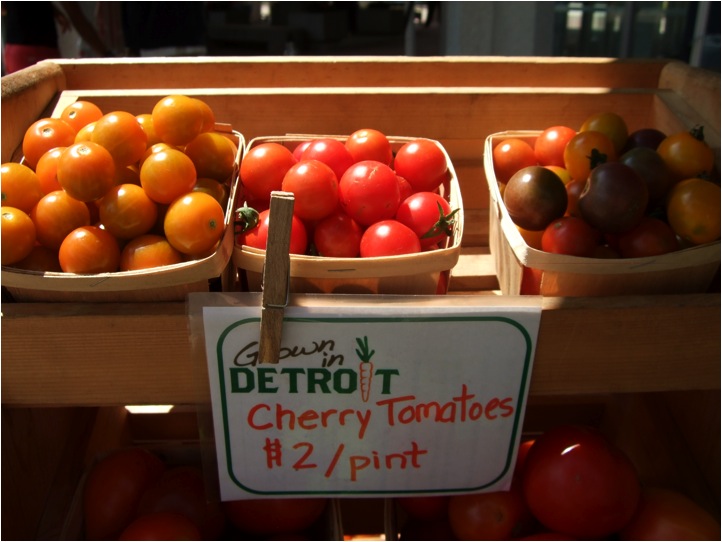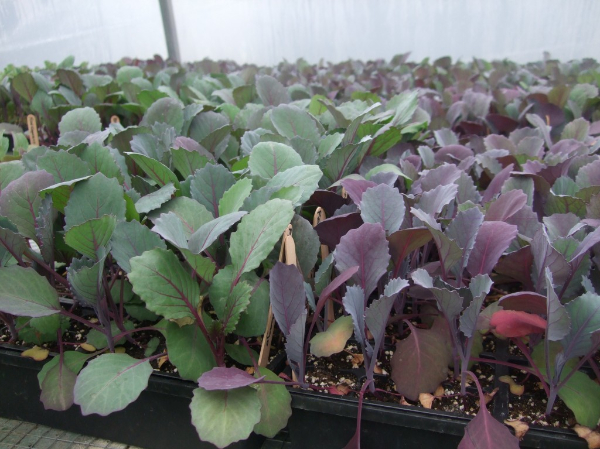It’s growing stronger communities, one garden at a time.

Spring is finally springing in Michigan, more or less. But at Keep Growing Detroit, gardening season is well underway.
You could call Keep Growing Detroit an urban gardening and farming project, but it’s much more than that. Established in 2013 as an offshoot of The Greening of Detroit, Keep Growing Detroit’s primary mission is to create a food sovereign Detroit, where a majority of the produce eaten in Detroit is grown right in the city.
I was first introduced to Keep Growing Detroit when I attended TEDMED in April, where Co-Director Ashley Atkinson was one of the speakers. Her presentation highlighted the success of Keep Growing Detroit as part of The Greening of Detroit over the last 10 years, expanding from 80 gardens in 2003 to 1,416 in 2012. These aren’t the kind of “allotment” gardens you see in most big cities, where each gardener is given a small plot to tend. Instead, they’re community-wide gardens that turn urban blight into a solution for the lack of healthy food available within the city limits.
As Atkinson explained during her presentation:
There are 40 square miles of vacant land in Detroit, and residents have to travel farther — and pay more — to find healthy food. When your environment is spiraling out of control, it’s hard to create healthy communities and individuals.
Keep Growing Detroit is changing all that. For an annual fee of just $10 per family or $20 for schools, community gardeners or markets, residents of Detroit, Hamtramck and Highland Park can join. These volunteers — 20,000 and counting — are given all the resources they need to tend a community garden, from seeds and transplants to trellis materials and training, both in gardening and in preparing produce that may be unfamiliar.
By bringing together individuals, civic organizations, churches, schools and community groups, Keep Growing Detroit is helping them grow more than 50 varieties of fruits and vegetables, including kale, cucumbers, red okra, arugula, tomatoes, spinach and ground cherries (which are highly sought-after by fancy restaurants).

About 90 percent of the crops are shared among the families and communities that grow them. The other 10 percent is part of a cooperative called Grown in Detroit, a group of about 75 growers that sell their crops to farmer’s markets and restaurants. For families and neighborhoods, the crops are a source of nutritious food that costs nothing but their time. Last year, the cooperative made nearly $80,000 selling their produce across Metro Detroit.
But there’s something even more important that’s being nurtured by Keep Growing Detroit: a stronger sense of community and civic engagement. This is what intrigued me most about Atkinson’s presentation, so I interviewed her after we returned to Detroit.
She uses the work of the Brightmoor community as one example.
Five years ago, there were three youth and community gardens. Neighbors started to rally around maintaining these spaces together. Now there are more than 30 shared garden spaces in a 20-block neighborhood. But it’s not just about urban gardening and farming — it’s about community re-development. The garden created a community environment where people are looking out for and taking care of each other.
Brightmoor now has a neighborhood-based nonprofit dedicated to community improvement. The group reports blight, illegal activity and suspected crimes. They board up abandoned houses, clean up abandoned lots and work with police to identify drug houses.
In other neighborhoods, civic engagement may be less formal, but it’s still the result of gardening together.
Neighbors from the same area are coming together, making decisions about sharing the land and what to plant, and creating rules about working and taking from the land as a team. When they start to build relationships and make decisions together that have a productive end, it makes it easier for them to have the more difficult conversations that happen in neighborhoods that are struggling and need to save themselves.
Ultimately, it’s this commitment to interdependence — working together to create a successful base of leadership in food production — that can lead to Detroit being a food sovereign city. A city that’s not only healthier but also a better place to live, says Atkinson.
There are opportunities for youth engagement and employment, and for residents to work with city decision-makers. Many of our garden leaders go on to do important work with education and community development. Some of the connections they make can even lead to new career opportunities. All because of leadership opportunities created through gardening and farming here in Detroit.
Learn more about the work of Keep Growing Detroit and how to get involved by visiting their website or calling (313) 757-2635. You can also support Keep Growing Detroit by buying produce bearing the “Grown in Detroit” label, available at Eastern Market and the Wayne State Farmers’ Market.
[Photos by Ashley Atkinson]



